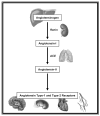The renin angiotensin system and the metabolic syndrome
- PMID: 20381510
- PMCID: PMC2886177
- DOI: 10.1016/j.physbeh.2010.03.018
The renin angiotensin system and the metabolic syndrome
Abstract
The renin angiotensin system (RAS; most well-known for its critical roles in the regulation of cardiovascular function and hydromineral balance) has regained the spotlight for its potential roles in various aspects of the metabolic syndrome. It may serve as a causal link among obesity and several co-morbidities. Drugs that reduce the synthesis or action of angiotensin-II (A-II; the primary effector peptide of the RAS) have been used to treat hypertension for decades and, more recently, clinical trials have determined the utility of these pharmacological agents to prevent insulin resistance. Moreover, there is evidence that the RAS contributes to body weight regulation by acting in various tissues. This review summarizes what is known of the actions of the RAS in the brain and throughout the body to influence various metabolic disorders. Special emphasis is given to the role of the RAS in body weight regulation. The paper represents an invited review by a symposium, award winner or keynote speaker at the Society for the Study of Ingestive Behavior [SSIB] Annual Meeting in Portland, July 2009.
2010 Elsevier Inc. All rights reserved.
Figures



References
-
- James WPT. The epidemiology of obesity: the size of the problem. Journal of Internal Medicine. 2008;263(4):336–352. - PubMed
-
- Ogden CL, Carroll MD, Curtin LR, McDowell MA, Tabak CJ, Flegal KM. Prevalence of Overweight and Obesity in the United States, 1999–2004. JAMA. 2006;295(13):1549–1555. - PubMed
-
- Jayasooriya AP, Mathai ML, Walker LL, Begg DP, Denton DA, Cameron-Smith D, Egan GF, McKinley MJ, Rodger PD, Sinclair AJ, et al. Mice lacking angiotensin-converting enzyme have increased energy expenditure, with reduced fat mass and improved glucose clearance. Proceedings of the National Academy of Sciences. 2008;105(18):6531–6536. - PMC - PubMed
-
- Massiera F, Seydoux J, Geloen A, Quignard-Boulange A, Turban S, Saint-Marc P, Fukamizu A, Negrel R, Ailhaud G, Teboul M. Angiotensinogen-Deficient Mice Exhibit Impairment of Diet-Induced Weight Gain with Alteration in Adipose Tissue Development and Increased Locomotor Activity. Endocrinology. 2001;142(12):5220–5225. - PubMed
Publication types
MeSH terms
Substances
Grants and funding
LinkOut - more resources
Full Text Sources
Other Literature Sources
Medical

